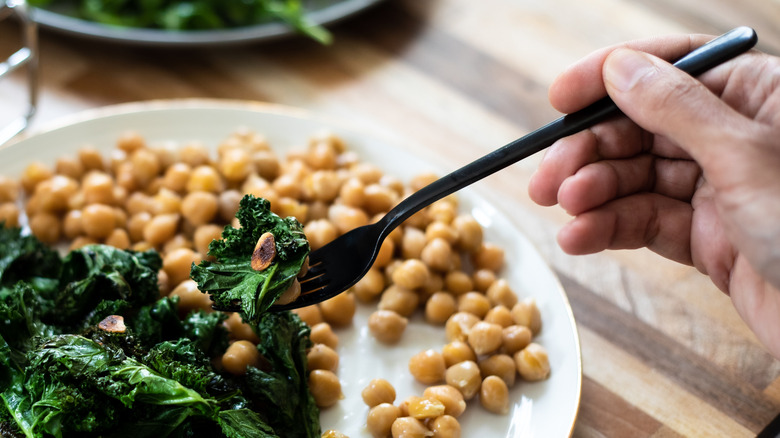
Vegetarians and vegans are well aware that plant-based protein extends beyond just veggie patties and meat substitutes. Legumes present a delicious and versatile option that can easily become the star of your meals. From tacos to homemade bean burgers (even breakfast bowls!), these fiber- and protein-rich powerhouses can seamlessly fit into nearly any dish.
Consider chickpeas, for instance. Their popularity stems from their mild flavor and ability to blend effortlessly into both savory dishes and even desserts. If you’ve tried chickpea cookie dough dip, you already know how well they satisfy a sweet craving. But chickpeas offer more than just great taste. With over 7 grams of protein in just half a cup of cooked chickpeas, they surpass the 6 grams you’d get from a large egg.
And while you’re opting for meat alternatives, you’re also reaping an additional health benefit: fiber. Unlike meat, chickpeas provide 6 grams of fiber, a crucial nutrient that aids in lowering cholesterol.
The fiber in chickpeas may slightly reduce cholesterol

Factors such as age, smoking, certain medications or health conditions, and a lack of physical activity can lead to increased cholesterol levels. However, diet plays a significant role as well. Foods high in saturated and trans fats can elevate cholesterol levels. Fortunately, chickpeas contain only a trace amount of saturated fat in half a cup, making them a safe choice.
Incorporating chickpeas or chickpea flour into your diet might even contribute to lowering cholesterol levels. A 2007 study published in the Annals of Nutrition and Metabolism revealed that participants who supplemented their diets with chickpeas experienced a notable reduction in cholesterol levels. During the study, participants followed either a chickpea-rich diet or a wheat-based one for five weeks before switching to the other for another five weeks. The chickpea diet included 140 grams of canned chickpeas (just under a cup), along with chickpea bread and chickpea shortbread, cumulatively providing 27 grams of fiber per day. Compared to the wheat diet, the chickpea-based diet reduced total cholesterol by nearly 3.9% and LDL (the “bad”) cholesterol by 4.6%.
Other benefits of chickpeas

Chickpeas provide more than just protein and fiber. They are also an excellent source of iron, folate, and health-promoting plant compounds. According to a 2023 review in Frontiers in Nutrition, natural compounds found in chickpeas may help reduce inflammation, which is often associated with chronic diseases. One specific peptide in chickpeas has even shown potential for combating cancer by interacting with a protein involved in tumor growth. Other peptides may aid in managing blood pressure by inhibiting the ACE enzyme, which is responsible for constricting blood vessels. Additionally, due to their low sugar content and high levels of protein and fiber, chickpeas help maintain stable blood sugar levels, preventing sudden spikes after consumption.
While chickpeas may not be a “complete” protein like those from animal sources, they do contain all nine essential amino acids needed by the body, albeit with half the methionine of an egg. To ensure a complete amino acid profile, consider pairing chickpeas with methionine-rich foods such as oats, quinoa, teff, or buckwheat.
“`




